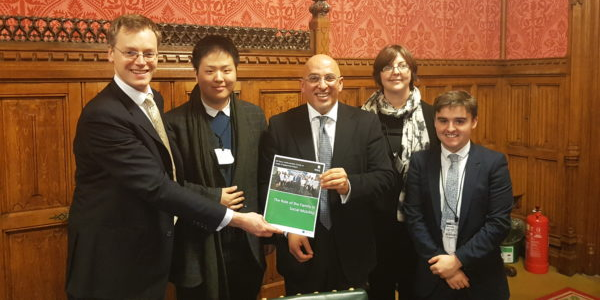Today the All-Party Parliamentary Group (APPG) for Youth Employment presented the draft report on The Role of The Family In Social Mobility to Nadhim Zahawi MP, Parliamentary Under Secretary of State for Children and Families.
The Minister attended the final meeting for the APPG to receive the report and to take questions from attending delegates. Two Youth Ambassadors from Youth Employment UK were able to ask the Minister questions.
The final report will be published once we have collated the minutes from today’s meeting and received answers from the Minister on questions put to him.
DRAFT APPG Report – The Role of the Family in Social Mobility
Overview of the inquiry, report and recommendations
There have been some exceptional speakers and some really engaging discussions in this series. The APPG has heard about the range of challenges young people face who cannot be supported by good family networks.
Hearing from young people directly who have experienced the challenge that a lack of family support can bring was really insightful. Young people without family support need government and local services around them to step up and step in to ensure that they do not get left behind and that they can fulfil their own potential.
The APPG has had submissions to this inquiry from leading organisations such as Centrepoint, Barnardo’s, Standalone, Talent Match and others. On behalf of the APPG for Youth Employment we would like to thank all of those people and organisations for their engagement.
Young people who were represented either at meetings or within the evidence provided include:
• Care leavers
• Young carers
• Homeless young people
• Young offenders
• Estranged young people
In the research presented by Dr Emily Rainsford at the very beginning of this inquiry we heard that family plays a crucial role in supporting young people into adulthood and into living fulfilled lives. Within the family Economic, Social and Cultural Capital is passed down from generation to generation. Where a young person is able to build trust, access opportunities and learn about work from their family members they are most likely to succeed into adulthood and can even move to a higher social stratum than that of their parents.
For young people without this family support they are left disadvantaged and will often fall behind that of their peers. They are likely to struggle through key transition periods and face multiple and complex barriers. Throughout the submissions it was clearly evident that young people who do not receive adequate support are at the greatest risk of downward social mobility, a problem that not only scars the life chances of those individuals but also a problem for the economy. A country that truly believes in a fairer society must take bold action to ensure that no one is left behind.
Often raised throughout the inquiry and the written submissions was the issue that there is no accurate understanding of the numbers of young people within these groups. Without understanding the number of young people affected by a lack of family support it is impossible to understand what investment, policies or services are really needed and to what extend existing policies and investment is working effectively.
Based on the evidence heard at the meetings and put forward in the written submissions, the APPG for Youth Employment is making the following recommendations to government:
Protect the benefits of young care leavers and carers
o Young adult carers should be classed as a “vulnerable group” by the Department for Education which would give them full entitlement to the 16-19 bursary. Young adult carers currently miss out on this vital support which would help them with the additional financial costs of learning. As a result, many either do not take up learning opportunities or drop out.
o Young care leavers should be reassured that their benefits will cover the cost of renting while job hunting. The government should extend the exemption of care leavers from the Shared Accommodation Rate of Local Housing Allowance until the age of 25, so that they do not have the pressure of making up the rent while studying or searching for a job. Local authorities can also show their support by exempting care leavers from council tax, as Southwark, Wigan and others have done already.
o The Department for Work and Pensions should make young adult carers exempt from the 21-hour rule in the benefit system. Currently, they lose the Carer’s Allowance of £62.10 per week if they participate in learning for longer than this each week. Most FE courses require longer participation, leaving young adult carers in a catch-22 situation. Given that many young adult carers have already lost out on several years of education as a result of their caring responsibilities, and that they and their families typically live in or on the edges of poverty, they deserve greater flexibility to gain the skills they need for successful careers.
Improve accessibility to Traineeships
o Extending the 6 month time limit for those who need more time to complete a traineeship.
o Allow greater flexibility in eligibility criteria, to widen participation for those young people who will benefit
o Improve awareness through national marketing campaigns and ensure that Local Government and service providers are able to offer and promote them.
Improve mental health services for care leavers This could be achieved by allowing care leavers to access child and adult mental health services to 25 for example, or by placing a specialist mental health worker in leaving care teams.
Provide education bursary support for young people without family support. The government should reintroduce a needs-based bursary similar to the Educational Maintenance Allowance in order to provide financial support for young people on low incomes who are seeking to further their education and job prospects.





